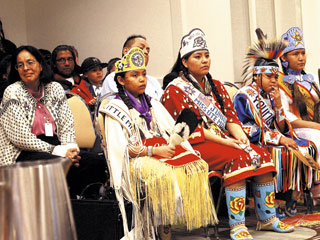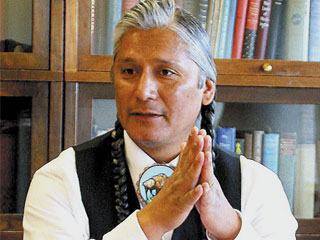Unity and future goals stressed by three Ute tribes
By Carol Berry, Today correspondent
“As one Ute nation we can become strong,” said Manuel Heart, a Ute Mountain Ute tribal council member. On behalf of the Ute Indians of the Uintah and Ouray Reservation, Utah, he said Colorado was “part of their homelands, too.”
He spoke at a meeting of the Colorado Commission of Indian Affairs March 18, which was followed the next day by the annual Tri-Ute spring meeting hosted by the Southern Ute Indian Tribe, Ignacio, Colo. for the Ute Mountain Ute Tribe, Towaoc, Colo. and the Northern Utes from the Utah reservation.
The Southern Utes presented a resolution and proposed bylaws for an official Tri-Ute Council since the three tribes “meet as the Tri-Ute Council on a regular basis to discuss issues impacting each tribe,” and a United Ute Veterans Association was approved for the three groups.
CCIA recommended that uniform contract language “respectful of tribal sovereignty” and a coordinated tribal consultation process be developed for government-to-government funding and negotiations between the state and the Ute tribes.
For the annual event, the Colorado General Assembly issued a joint resolution that noted “the major influence on the history of this state that the Ute nations have provided and continue to provide” and recognized “Colorado’s oldest continuous residents, the Southern Ute Tribe and Ute Mountain Ute Tribe, as well as the Northern Ute and all other tribal nations and Alaska Native residents in the state.”
 |
| Carol Harvey, Navajo, new Colorado Commission of Indian Affairs executive secretary (left), attended the annual Tri-Ute spring meeting held at the time of the Denver March Powwow. In the front row are young Ute Mountain Ute royalty waiting to be introduced to attendees from the Southern Ute Indian Tribe, Ute Mountain Ute Tribe and Ute Tribe of the Uintah and Ouray Reservation, Utah, as well as those making presentations to the group. |
Although the legislature honored
the “rich and storied heritage” of all three Ute tribal nations, it
reserved continued support for the two Colorado Ute tribes “in their
own efforts to improve public safety, education, health care and law
enforcement on their reservations.”
It was those social and economic areas of need that provided most of
the discussion at both meetings, rather than the 19th century
attempts to force the Utes to leave their nomadic lifestyle and take
up farming, leading to a confrontation termed the Meeker Massacre by
area settlers.
Matthew Box, Southern Ute tribal chairman, described problems tribal
members encountered after the tribe assumed management of the
formerly IHS-operated Southern Ute Health Center in southwestern
Colorado.
Because of limited funding, services IHS should have paid for were
not being paid and when the tribe took over the operation last year,
there were $1.7 million in unpaid bills for tribal members alone and
some of the bills were sent to collection agencies. The tribe has
worked to alleviate the problem for tribal members, but it is still
an IHS responsibility, he said.
Both Ernest House Sr., Ute Mountain Ute tribal chairman, who chaired
the Tri-Ute meeting, and Heart stressed health care for tribal
members, noting the aging of baby boomers and rising rates of
diabetes and heart ailments.
House said his tribe is looking at priorities that may include
renewable energy, hydropower, coal initiatives and possible
additions to the tribe’s casino, “to see if we really want to go
that route.” Nearly all tribal officials said education was a
priority, citing high dropout rates and a need for greater student
support.
Curtis Cesspooch, Northern Ute tribal chairman, described changes on
the Uintah and Ouray Reservation, including the leveling of the old
Bottle Hollow Resort and its replacement with a new tribal museum.
He also said a bottling plant may be operating by late spring,
noting that “a lot of old enterprises failed because of marketing
defects.”
Cesspooch described a conflict with the Utah Transit Authority, when
the tribe successfully confronted UTA over its attempt to extend
light rail into a cultural site. Now, however, UTA is trying to use
a nearby private site as a possible unlimited density development
and, because it is on private land, feels it can bypass
environmental and tribal consultation laws in a move by an agency he
termed “oppressive.”
In another area, the Tri-Ute Games for youth July 21 – 24 on the
Uintah and Ouray Reservation may have the added benefit of fighting
obesity and diabetes among young people and can foster identity,
tribal leaders said.
Box described the gathering as one example of the tribes’ getting
together so youth can meet their relatives in the various bands and
“know who they are,” and the games can promote and develop athletes
for the Native American Indigenous Games and Olympics competition.
He also pointed out that the upcoming spring Bear Dances are an
opportunity for collective renewal.
Terry Knight, a Ute Mountain Ute spiritual and cultural leader,
suggested an event at the Tri-Ute Games for throwing the atlatl, a
10,000-year-old spear throwing device. Others proposed a revival of
shinney, an informal kind of lacrosse.
At the CCIA and Tri-Ute meetings the new CCIA chair, Carol Harvey,
Navajo, was introduced, and outgoing chair Ernest House Jr., Ute
Mountain Ute, was honored for his five years of service and
accomplishments. He was enrobed in Pendleton blankets by the CCIA
and his tribe and was given the ancestor name, Tapuche, connoting
rock, staunch support and strength.
A private firm and several federal agencies presented their programs
to the Tri-Ute meeting, including the Forest Service, which fielded
questions about potential confrontations between its staff and
Native people authorized to collect plants or purification lodge
rocks on public lands, which are also “ceded aboriginal lands,” it
was noted.
© 1998 - 2010 Indian Country Today. All Rights Reserved To subscribe or visit go to: http://www.indiancountry.com
